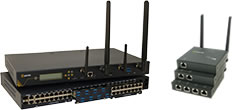
Cloud vs. on-site data storage: The rise of IaaS
By Max BurkhalterApril 7, 2020
Cloud computing has become a dominant force in the business technology market, boasting lower upfront costs, unmatched scalability and improved performance compared to traditional on-premise computer systems. According to research from LogicMonitor, an estimated 83% of all enterprise workloads are expected to be performed in the cloud by the end of 2020. But as companies continue to integrate cloud-based services into their workflows, many are questioning whether on-site hardware and software are truly obsolete.
Breaking down the cloud market: SaaS, PaaS and IaaS
The modern cloud computing market can be segmented into several different subcategories based on the type of services being delivered. The most straightforward example is software-as-a-service (SaaS) products, which allow users to access web applications through an internet connection without having to download anything onto their workstations or personal computers. Platform as a service (PaaS) offers advanced software development tools and application management features that smaller businesses could not otherwise afford. While infrastructure-as-a-service provides scalable data storage and virtualization capabilities that help reduce the burden placed on internal systems. Together, these three service areas account for the vast majority of enterprise cloud investments.
Currently, around 94% of enterprises use some form of cloud computing, according to a 2019 study from RightScale, though the exact details vary between organizations - an estimated 91% of businesses use public clouds, 72% rely on private clouds and 69% utilize a hybrid solution. Here's a quick look at the similarities and differences between these cloud integration strategies:
- Public clouds: This type of cloud-based system is managed entirely by a third-party vendor, removing the need for organizations to perform regular maintenance and keep track of updates. All data is stored in the cloud provider's data center and is secured through a complex encryption process.
- Private clouds: In contrast, private clouds are owned, operated and maintained by the business itself, often residing in the company's intranet or hosted data center. Since internal IT teams are responsible for updating and managing this type of cloud system, it's often considered more labor-intensive than many alternatives.
- Hybrid clouds: This approach to cloud integration combines elements of both public and private clouds into a single solution, which is valuable for organizations that must ensure certain security guidelines are upheld. For example, a health care provider could use a private cloud to house sensitive patient information that falls under HIPPA, but rely on a public cloud for internal communications.
Since every enterprise has different needs and limitations, it's important for IT administrators to understand the types of data they collected and store before defining their broader cloud strategy. This is particularly crucial when deploying IaaS solutions, as protecting the confidentiality of customer and business data is a top priority.

On-premises vs. cloud storage
The debate over cloud-based data storage vs. physical, on-premises hardware is only heating up as new innovations hit the enterprise IT market. While IaaS solutions are often considered more cost effective and easier to manage, according to research from SpiceWorks, they often lack the decisive control organizations need to protect sensitive information. When a business entrusts its data to a third-party provider, there is no guarantee that best practices in cyber security are being consistently applied. This lack of oversight can not only leave enterprise customers vulnerable to identity theft and exploitation, it can also lead to major business disruptions. As noted by Cloud Security Alliance, cloud-based storage services commonly face the following threats:
- Data leaks
- Comprised administrator accounts
- Authentication bypass
- API and interface hacking
- Permanent data loss
Before integrating any IaaS product, companies must first conduct a thorough audit of their business and customer data to understand what information is being collected and how it's being stored. While an organization that does not gather consumer data may be less concerned about unauthorized access, most businesses have something to protect - proprietary information, market research, patents and more. In cases where robust encryption and authentication are needed, it's recommended that IT administrators retain control over their storage hardware and software.
Even under the most favorable conditions, organizations can still suffer severe consequences if their cloud vendor is compromised by a cyber attack or accidentally misconfigures key protocols. According to research from the cybersecurity firm McAfee, roughly 99% of all cloud misconfigurations go unreported. This means that many tech-minded enterprises likely have vulnerabilities they are unaware of, especially those that take a hands-off approach to their IaaS systems. Despite the pressing need for quick and seamless resolution of these configuration issues, 74% of surveyed IT professionals said they were unequipped to deal with large-scale audits.
The choice between cloud-based and on-premise data storage boils down to organizations' individual needs and IT budgets. Companies looking to maximize their control over critical assets and data would be best served by a private cloud, while those looking to reduce their overhead may prefer a public or hybrid solution.
Regardless of where your organization is on the path to cloud adoption, Perle offers the industrial-grade networking equipment you need to protect your data and business operations. Our reliable Ethernet switches and serial device servers empower enterprises to build customizable data architectures that meet their exact needs. To learn more, read through some of our customers' success stories.



